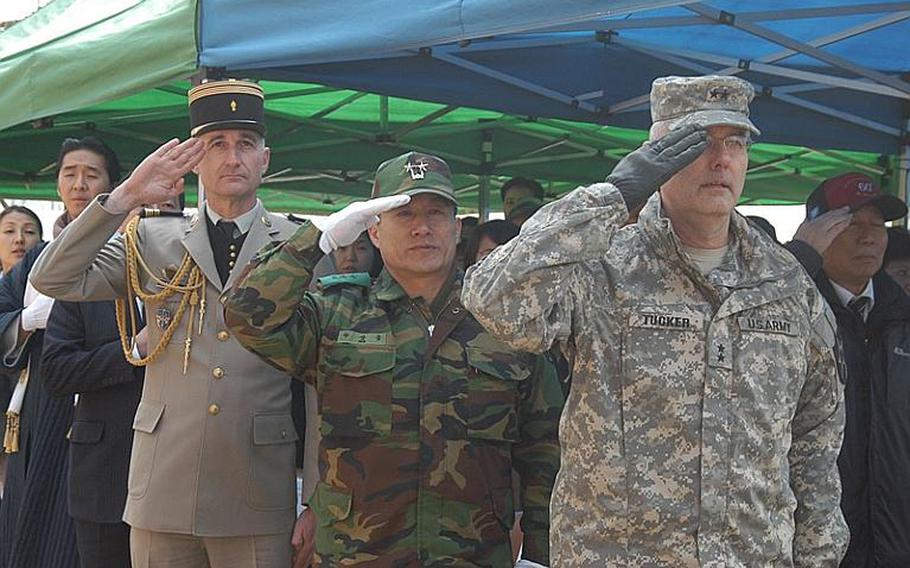
From left, Col. Eric Jouin, French Embassy defense attache; South Korean Maj. Gen. Na Sang-woong and U.S. Army Maj. Gen. Michael Tucker, commander of the 2nd Infantry Division, salute during the playing of the three countries' national anthems at ceremonies Tuesday marking the 60th anniversary of the Battle of Chipyong-ni. The 1951 battle is considered the turning point in the Korean War. (Jon Rabiroff/Stars and Stripes)
JIPYEONG-RI, South Korea — Lee Jeong–hun recalled Tuesday how, as a teenager, his family and village were terrorized by the militaries of China and North Korea early in the Korean War.
He once hid in a pasture as Chinese soldiers forced their way into his home and cooked themselves a meal. Another time, a North Korean army official ordered the young man to guide a platoon to a specific part of the town.
“I was reluctant to do it, but the commander pointed his pistol at my grandmother, so I escorted his platoon,” Lee said.
It was 60 years ago this week that Lee’s hometown — then called Chipyong-ni — became the scene of what is widely considered to be the turning point in the 1950-53 Korean War.
The Battle of Chipyong-ni — which was fought Feb. 13-15 in 1951, about 30 miles southeast of Seoul — marked the first time United Nations Command soldiers succeeded in turning back the advance of the Chinese military.
When it was over, almost 100 U.N. troops and about 2,000 Chinese soldiers were dead or missing.
Lee, 79, was among 200 people in attendance Tuesday at ceremonies marking the 60th anniversary of the battle. He said he is part of an organization trying to raise money and collect artifacts for a museum it hopes to build, “so future generations understand the significance of this battle,” he said. “If we had lost that battle, Korea itself would not exist.”
U.S. Army Maj. Gen. Michael Tucker, commander of the 2nd Infantry Division, told those in attendance that Chipyong-ni was an important transportation and communication hub, making it an attractive target. Outmanned by a ratio of roughly 15:1, he said, “For two horrific, bloody frigid nights, (allied) soldiers held against impossible odds. The courage and determination of these brave men made not only a tactical but strategic impact on the war.
“Indeed, their actions helped shift the tide of the war,” Tucker said.
“Before the Battle of Chipyong-ni, United Nations Command forces typically rolled with the punch when confronted by superior numbers,” he said. “Rather than stand and fight, the allied forces would withdraw to a rear position in order to avoid being encircled by the enemy.
“But it is here at Chipyong-ni that the 8th Army commander, Lt. Gen. Matthew Ridgeway, decided to make a stand,” Tucker said.
“In the aftermath of Chipyong-ni, the (Chinese) Army limped north,” he said. “It was the last Chinese offensive of the Korean War, and within four months the Chinese high command requested truce talks.”
South Korean Maj. Gen. Na Sang-woong said the Battle of Chipyong-ni and the Korean War taught his countrymen that “we cannot enjoy freedom and peace without a strong power” behind us.
“Even though the Cold War has ended in the other nations, the Korean peninsula is a lonely place still going through a cold war,” he said. “If North Korea does not give up developing nuclear bombs and missiles, under the propaganda of colonizing the South, it will difficult to have peace on the peninsula.”